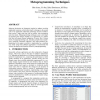Free Online Productivity Tools
i2Speak
i2Symbol
i2OCR
iTex2Img
iWeb2Print
iWeb2Shot
i2Type
iPdf2Split
iPdf2Merge
i2Bopomofo
i2Arabic
i2Style
i2Image
i2PDF
iLatex2Rtf
Sci2ools
ACMSE
2008
ACM
2008
ACM
Profiler instrumentation using metaprogramming techniques
Software developers are frequently required to address evolving stakeholder concerns, which often result in changes to the source code of an application. Manually performing invasive modifications across a large code base can be tedious, time consuming, and error prone. Metaprogramming techniques assist a developer in specifying the changes needed to an application in a manner that does not require manual adaptation of source files. Various forms of metaprogramming exist, including compile-time metaobjects, load-time structural reflection, and aspect-oriented programming. In this paper, a profiler is implemented as a common case study using three different approaches to demonstrate the various mechanisms and benefits offered by metaprogramming.
ACMSE 2008 | Large Code Base | Load-time Structural Reflection | Metaprogramming | Theoretical Computer Science |
Related Content
| Added | 12 Oct 2010 |
| Updated | 12 Oct 2010 |
| Type | Conference |
| Year | 2008 |
| Where | ACMSE |
| Authors | Ritu Arora, Yu Sun, Zekai Demirezen, Jeff Gray |
Comments (0)

